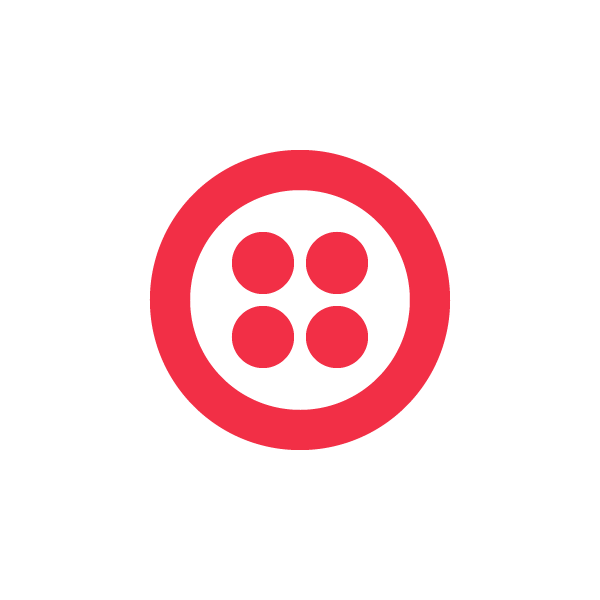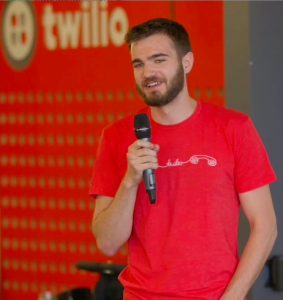Introducing Twilio Developer Evangelist Chris Hranj
Time to read:
This post is part of Twilio’s archive and may contain outdated information. We’re always building something new, so be sure to check out our latest posts for the most up-to-date insights.

I sat on the bus in wonder, both scared and excited for what would lie ahead of me when the doors opened. Anticipation and uncertainty dwelled in the pit of my stomach. I felt like a little kid on the way to the first day of kindergarten, when in fact I was in my sophomore year at The College of New Jersey. This bus wasn’t taking me to school, but to the financial district of Detroit, Michigan where I was joining nearly 1000 like-minded students, many undoubtedly going through the same anxiety as I. This event would be far from the normal eight hour school day. Today there was only one class and it was 36 hours long. This was MHacks III and it was my first hackathon.
Hacking Time

My nerves quickly settled when I realized that hackathons are not a competition but a facility to learn and grow as a developer. Events like MHacks strive to build a community of students and encourage them to try something new and focus on doing their best rather than being the best. Hackathons provide all of the resources for students to turn their ideas into reality.
The hack that my team worked on became known as FacePress. Its purpose was to solve a common problem amongst hat-wearers: How do you figure out what your fitted hat size is without trying one on? Many people don’t know that fitted hats adhere to a strange sizing scheme, making them difficult to purchase online.
The solution soon became clear and only one simple instruction was required: roll your forehead left to right across the keyboard.
The app calculated the greatest distance between any pressed keys, thus measuring a small portion of the user’s head. This measurement made it possible to calculate the circumference of the head using a little bit of algebra and a scale factor. The hack was built using nothing more than JavaScript with a little bit of jQuery and some HTML. After picking a catchy domain name, FacePress was a respectable, finished product.
Lessons Learned
The hackathon ended with a “demo jam” in which judges evaluated all of the hacks made over the course of the weekend. At the end of the day, FacePress did not win any prizes or receive any special recognition, but everyone that tested the app was intrigued and delighted by the ridiculousness presented before them. I was impressed by the finished product and how much I learned while building it. The overall experience was more valuable than any cash prize.
I learned a valuable lesson at MHacks, one that should always be kept in mind at events like this:
A simple idea should be built using simple tools. Far too often developers overcomplicate their apps by trying to incorporate every new tool available.
The lifespan of the average hackathon hack is rarely longer than a weekend. My advice: avoid trying to bring machine learning, real-time communication, OCR, and Arduino into one monolithic hack. The well-known UNIX philosophy says to “do one thing and do it well.” My team adhered to this philosophy unknowingly and it lead to a unique and surprisingly functional finished product.
The sheer number of people and the crazy things that they build are enough to overwhelm both experienced and first-time hackathoners. Start small and understand that there is no need to reinvent the wheel in order to have a good time.
No child has ever entered kindergarten expecting to learn everything on day one. Still, I left MHacks feeling like I learned more in a weekend than I did in a semester at school.
Looking Forward

Serving the developer community enables and inspires me to make a positive impact on the world. My goal is to impart the lessons that I learned at my first hackathon to both hackathon attendees and anyone around me learning and building software. MHacks empowered me with a desire to learn that grows stronger every day. My job is now to pass that desire onto others in the community.
If you have any questions about hackathons or about my experiences as a developer evangelist, feel free to reach out to me at @brodan_, or find me in the Bay Area.
Related Posts
Related Resources
Twilio Docs
From APIs to SDKs to sample apps
API reference documentation, SDKs, helper libraries, quickstarts, and tutorials for your language and platform.
Resource Center
The latest ebooks, industry reports, and webinars
Learn from customer engagement experts to improve your own communication.
Ahoy
Twilio's developer community hub
Best practices, code samples, and inspiration to build communications and digital engagement experiences.